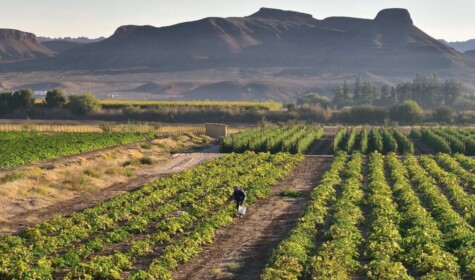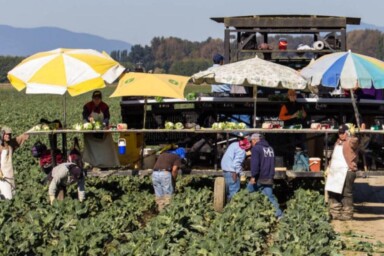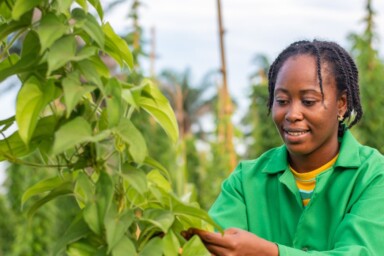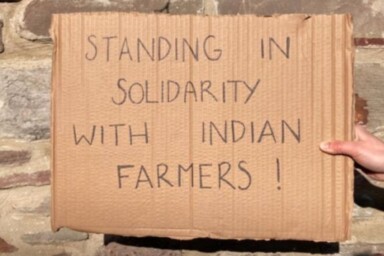The 2013 increase in wages was a defeat for landed farmers. South African farmworkers’ demands increased wages from the established minimum wage of 69 rand a day (£3.52) to 150 rand a day (£7.72). Farmers applied for exemptions based on their stated inability to pay, arguing that any increase in wages would result in systematic processes of retrenchment, mechanisation or the abandonment of farming altogether. With the victory afforded to protesting workers, a negotiated settlement of 105 rand per day left farm workers bearing the brunt of their collective struggle for a living wage. The new minimum wage led to thousands upon thousands of farmworkers losing their jobs across the country. Critics called the minimum wage increase of more than 52% ‘highly inflationary’ (The Citizen, 6 February 2013). Supportive journalists argued that ‘Growers do not operate in a vacuum, but are part of global value chains subject to various pressures’ (Margaret Visser and Stephanie Barrientos, Cape Times 22 Nov. 2012). This version casts farmers as trapped in a global economy where the rand does not fare well and where, contrary to stereotypes that most fruit farmers are rich, they are ‘struggling’. However, another version of the story, is that farmers are struggling to maintain their relative prosperity in a highly competitive global market, with all ethical considerations to the well-being of people put second to profit.
An outside study commissioned by the agricultural trade association Agri SA, determined that if the majority of farmers met workers’ demands of 150 rand per day, they would be forced to reduce staff, mechanise or face closure. Banks reported that they would not honour requests for loans to meet the demands of the new wage, and some farmers worried that the industry would collapse altogether without government initiatives to subsidise commercial farmers. Ironically, the very same study found that the raise in wage would not ameliorate the high levels of malnutrition and systemic poverty experienced by landless farmworkers. The situation was thus vexed on all fronts, with apparent risks for famers and farmworkers.
The farm strikes for a living wage accelerated the process of changing patterns of employment on farms in South Africa towards more flexible forms of labour. A greater reliance on seasonal contract work began to characterise the agricultural landscape. The argument that protests over farmworkers’ wages signals the urgency and complexity of generating a minimum wage policy in a globalised sector that is struggling to balance equity with the demands of the market, is generous at best.
The rhetoric of the market to defend business interests belies the reality of human suffering and systemic racism after apartheid. Take for instance, the story of Sanna Beaukes. Sanna lives in the heart of the tourist wine route in the Western Cape. She began her career as a farm worker at the age of 6 in 1991. Trained by her parents in pristine vineyards, she became skilled in the art of pruning and harvesting grapes. She became equally knowledgeable about irrigation systems, fertilisers and other details that accompany the grape growing process. At the height of farmworker protests in 2013, I asked Sanna if she would join the movement. She said, ‘I would love to strike, but my father is dead and the farmer came to us in the vineyards and warned us that if we strike, we lose our jobs.’ Sanna did not strike but lost her job anyway. Her employer – the son of her parent’s former employer on the farm – found ways to compensate for his ‘loss’ of income due to the wage rise by charging rent, electricity and water and threatening farmworkers with eviction from their homes. Many farmers in the country responded in this way, repealing services such as the transportation of children to school or providing workers with minimal health care provision.
After more than 21 years working on the same farm on which her parents and grandparents and great grandparents had worked, Sanna was retrenched. Her working life as a child was seen as an extension of her household responsibilities and it had not been remunerated, so it was only at age 16 that she started earning a wage. After a lifetime of service and without her father’s wages and an elderly mother too frail to work, she suddenly became reliant her brother’s wage. This rupture in agricultural relations, the ironic outcome of protest action to stem poverty, plummeted Sanna into a desperate situation with two children to look after. Nearly starving to death and unable to pay for her most basic needs, she tried to take her own life. Her hunger, depression and desperation took place less than 70 paces from the main farmhouse with its multiple cars, elaborate Cape Dutch architecture and fancy manicured garden. The landed farmer’s children attended private boarding schools. Hunger in their home was unthinkable.
Another man I spoke with complained about an escalation of hunger on farms after the increase in the national wage. Hunger among agricultural workers is surely one of the industry’s most tragic legacies. He said, ‘We can afford to eat a three kilo chicken twice a month and for the rest we eat potatoes, bread and sometimes an egg.’ That he farms grapes and other soft fruits on an agriculturally rich farm is an existential irony of sinister magnitude.
In 2010, some farmers imposed a new rent for all children living on farmer’s land who were not in school and not working on the farm. A woman with whom I spoke said, ‘The farmers are forcing us to chase our own children away. How can we afford to pay rent for our children?’ She was also charged for having friends visit and explained that the farmer justified this charge because her friends drank his water and must pay for it.
While these stories of everyday life on farms are not directly related to the production of food that is sold in national and international markets, they are the hidden subtext of South African class and race relations as played out along similar lines as slavery at the Cape. One would have hoped that, over time, especially in the aftermath of apartheid, land would have been distributed in such a way that ordinary people would not be reliant on selling their labour for survival. Activism in the agricultural industry is ongoing and many activists are encouraged by the increase in national wage but the picture on the ground for women whose jobs have been lost paints a rather bleak picture. It is quite difficult for me to eat fruit and drink wine when I know so much about the conditions of labour relations on farms and the connections with global trade and a corrupt state that has not found ways to look after the very people who produce nourishment for the privileged minority.






